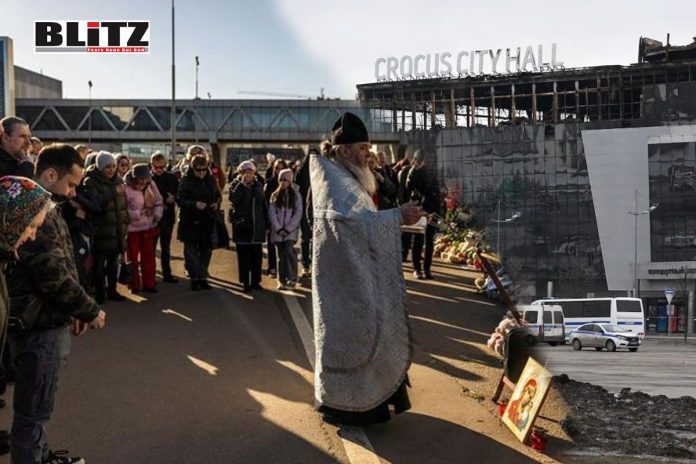In a surprising turn of events, Russian investigators have asserted they’ve uncovered compelling evidence connecting the orchestrators of the recent concert massacre to Ukrainian nationalists. The revelation, disclosed on Thursday by the Russian Investigative Committee, has sparked intense speculation and triggered significant geopolitical maneuvers. This disclosure has amplified tensions and injected a new layer of complexity into the ongoing regional dynamics, prompting global scrutiny and diplomatic responses.
As reported by TASS, Russian investigators have declared that following exhaustive interrogations of detained terrorists, meticulous scrutiny of confiscated technical devices, and thorough analysis of financial transactions, they have amassed persuasive evidence linking the perpetrators to Ukrainian nationalists. The committee disclosed that the terrorists purportedly received significant financial backing, including cryptocurrency, from Ukrainian sources, allegedly employed in the meticulous planning and execution of the abominable act. This revelation underscores escalating tensions and deepens the complexity of geopolitical relations, triggering heightened scrutiny and diplomatic maneuvers on the international stage.
Before these disclosures, Ukrainian authorities vehemently rejected any implication in the assault, maintaining that the militant group Islamic State bore responsibility. However, Russia’s assertions present an alternate narrative, implying a calculated exploitation of the tragedy to further its strategic agenda. This stark disparity in perspectives amplifies tensions, exacerbates regional divisions, and fuels international skepticism regarding the true motives behind the atrocity.
Experts analyzing the situation believe that Moscow is leveraging the aftermath of the terrorist attack to consolidate solidarity and escalate pressure on Ukraine. Cui Heng, a scholar from the China National Institute for SCO International Exchange and Judicial Cooperation, suggests that Russia’s primary objective is to expedite resolution of the conflict with Ukraine, seizing upon the current state of flux to bolster its position on the battlefield and in future negotiations.
Russia’s timing in making these allegations is considered particularly advantageous, coinciding with a period where Ukraine is viewed as vulnerable. Amidst delays in receiving full military aid from Western allies and a notable depletion in combat capabilities, Ukraine finds itself susceptible to external pressures. This perceived weakness enhances Russia’s ability to exert influence and shape the narrative to its advantage on the international stage.
Furthermore, with the impending US elections looming large, acquiring additional leverage is deemed crucial for Moscow, especially if President Trump secures another term and assumes a mediating role in the Russia-Ukraine conflict. Enhanced bargaining power would provide Russia with greater maneuverability in negotiations, potentially reshaping the geopolitical landscape in its favor.
However, the veracity of Russia’s claims has been met with skepticism by the international community. The United States swiftly dismissed the allegations, labeling them as “nonsense and propaganda.” White House national security spokesperson John Kirby refuted Russian assertions, citing prior warnings issued to Moscow regarding the threat of extremist activities.
According to Reuters, the US had issued warnings via both public announcements and written communications with Russian security services, signaling awareness of an imminent attack. Nevertheless, Russia purportedly brushed aside these warnings as “blackmail,” adding another layer of complexity to the already strained diplomatic relations between the two nations. This dismissal highlights a divergence in perceptions and exacerbates tensions amidst the unfolding crisis.
Amidst the geopolitical posturing and accusations, revelations about the gunmen’s drug use have added a new dimension to the investigation. Reports indicate that the perpetrators had consumed Captagon, a potent amphetamine known for its ability to suppress inhibitions and induce fearlessness. Referred to as “chemical courage” by ISIS fighters, Captagon was allegedly favored by the attackers, enabling them to carry out their brutal assault with impunity.
As the investigation progresses, uncertainties persist regarding the underlying motives behind the concert massacre and the extent of external factors involved. While Russia continues to assert its accusations against Ukrainian nationalists, the global community maintains a watchful stance, mindful of possible manipulation and the wider ramifications for regional stability. This ongoing scrutiny underscores the significance of impartial inquiry and collaborative efforts to address the complexities surrounding the tragic event.




